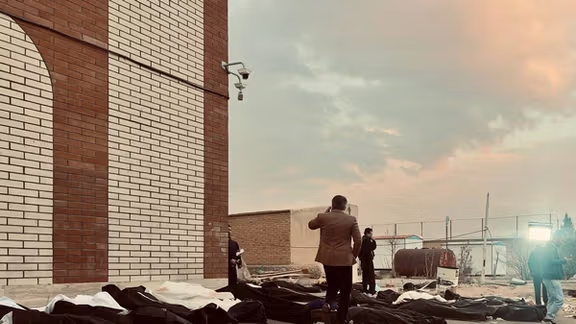The chants of that autumn have given way to vindictive attacks online and heated but more cordial arguments in living rooms, where friends and families debate what should come next as if the Islamic Republic had already fallen—or as if anyone truly knew how, or when, it could.
It was meant to be a relaxed family gathering: tea glasses on the table, satellite television murmuring in the background, the usual jokes about officials and inflation. Then images appeared on the screen: young women waving pre-revolutionary flags in Berlin.
The room fell quiet. Auntie Nahid sighed.
Uncle Saeed, Nahid’s brother, mimicked her sigh. “You still don’t get it, do you?” he said. “You really think such protests could lead anywhere without a leader?”
That was all it took.
Nahid—my mother’s sister—had been a leftist before and after the 1979 revolution, a university activist who opposed the monarchy but refused to board the Islamic bandwagon. Decades later, she still rejects the idea of restoring either.
Saeed, once a quiet junior employee at the trade ministry, had joined the wave of early believers in Khomeini’s revolution. For a year or two he called it sacred. Now, in his early seventies, he’s our family’s most ardent supporter of the fallen Shah and his exiled son, Reza Pahlavi.
“You’re being as ridiculous as you were forty-five years ago,” Nahid snapped. “Then you kept asking ‘Do you believe in Khomeini or not?’ You wanted allegiance then, you want allegiance now.”
“I don’t want allegiance,” Saeed replied, his voice rising. “I just say let’s rally behind Pahlavi, because he’s the only alternative. You’re being as evasive as you were back then. If it’s between Pahlavi and the Islamic Republic, which one do you choose?”
“I won’t go along with your false binary,” Nahid said. “We must try to bring about real change, something that’s neither this nor the past.”
Saeed shook his head. “That’s just nice words. Reality is he’s the only one with a chance of bringing them down. He’s got international support, which is necessary in this ruined land. You may not like it, but it’s always been like this. Big powers decide who comes and who goes—or at least they have to be okay with it, or nothing happens.”
“That support,” Nahid replied, “is exactly why I don’t like it. It’s 2025, for heaven’s sake, not 1925. We should at least aspire to do better than that.”
“There, that’s your problem,” he said with a bitter smile. “You’re idealistic. And your idealism keeps us from getting rid of this regime.”
Nahid shook her head so fiercely you feared her neck would crack.
“You’re being ridiculous again,” she shouted. “Who’s this ‘us’? And how am I stopping it? Take to the streets and I’ll be the first to back you. But where’s the organization? Where’s the call to action? If any group were really an alternative and thought it stood a chance, they wouldn’t waste their time arguing with others. They’d just take over and deal with obstacles like me later.”
“All I’m saying,” Saeed muttered, clearly trying not to aggravate his younger sister further, “is we should gather around one figure and give it a go. Otherwise we’ll be stuck with this bunch forever.”
Nahid turned toward him, voice softer but no less bitter. “You loved getting behind one figure back then, and we know how that ended. You followed me two blocks on the way to protest the compulsory hijab in March 1979 to dissuade me, because it would ‘harm the revolution,’ remember?”
The room went still. My father, sensing where it was headed, stepped in: “Could you not ruin the night for the hundredth time? To hell with them all.”
The quarrel dissolved into silence, then small talk. But the argument lingered in the air—one that feels as old as the Islamic Republic itself.
What unfolded that night could have taken place in any number of Iranian households. Families that once shared the same dreams now sit on opposite sides of the country’s unhealed divide.
Some who once chanted for revolution now argue for reform. Many who once preached patience now want collapse—foreign intervention even.
What separates people like Nahid and Saeed is not only ideology but the shape of their disillusionment. Both, in their own ways, are haunted by the 1979 choices that promised liberation and delivered repression.
As the evening wore on, the conversation drifted back to the mundane: rising prices, the neighbor’s noisy parties—and of course, the leaked wedding video of Shamkhani’s daughter.
On the muted television the images from Berlin looped once more—a bright moment fading into memory as we quarrel over who should bring down a theocracy that shows no sign of budging.



















